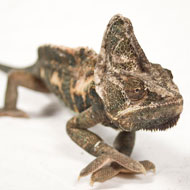Pet shop guidance "misses the mark"

Veterinary surgeon Mike Jessop says the guidance badly fails the health and welfare of unusual pets.
New guidance that was meant to improve pet shop husbandry and sales practices has fallen short of its aim, according to authors of a scientific review.
Veterinary surgeon Mike Jessop, who co-authored the review, said the new guidance has missed its mark.
The "Model Conditions for Pet Vending Licensing" (MCPVL) has been issued by the Chartered Institute for Environmental Health (CIEH). Scientists writing in the Animal Welfare, Science, Ethics and Law journal have deemed the guidance unfit for purpose.
Mr Jessop said: ""The CIEH document was an ideal opportunity to unify the variable local standards to one national benchmark. It was supposed to draw on the Animal Welfare Act 2006 and update the previous guidelines of 1999.
"It was the lack of wide consultation and the failure to draw on existing evidence and advice from experts in their field that has caused this document to miss its mark.
"It is a great sadness that the health and welfare of the unusual pets has been so badly failed. The better parts of the document were the sections on dogs and cats that are now rarely traded in pet shops. The species that needed this document most, have been the least well served."
Kat Stuart from the Animal Protection Agency added: ""We do commend the CIEH on their efforts to issue much needed information to local authorities on pet shop management.
"However, the MCPVL guidance falls well short of the mark, and has missed an opportunity to produce a quality document. Fortunately, the 'MCPVLs' are set to be superseded by independent scientific evidence-based guidance."



 The Greyhound Board of Great Britain has published new vaccination guidance, with all greyhounds registered from 1 January, 2027 required to have the L4 leptospirosis vaccination, rather than L2.
The Greyhound Board of Great Britain has published new vaccination guidance, with all greyhounds registered from 1 January, 2027 required to have the L4 leptospirosis vaccination, rather than L2.